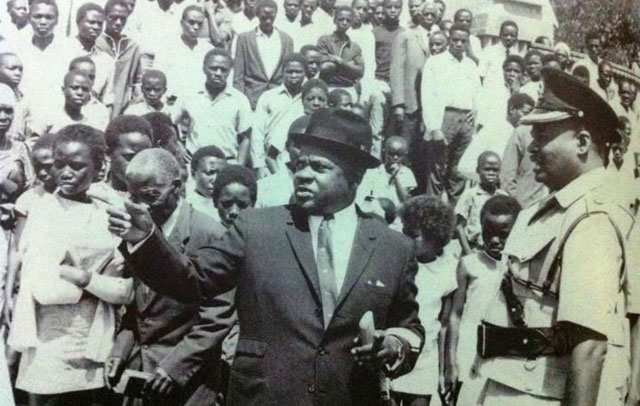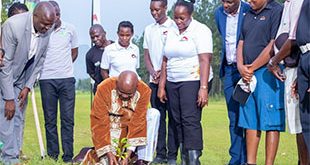
Mbale, Uganda | THE INDEPENDENT | From supporting Rwenzururu secessionists from Tooro Kingdom in 1960s to supporting the return of the lost counties to Bunyoro kingdom, direct elections in Buganda in 1961 ahead of independence, a new book details Uganda’s first short lived prime minister, Benedicto Kiwanuka’s political maneuvers.
Titled Contesting Catholics: Benedicto Kiwanuka and the Birth of Post-colonial Uganda by Jonathon Earle, Visiting Fellow, Trinity College, Cambridge University, and Jay James Carney, an associate Professor of Theology, Creighton University, the book was launched yesterday evening in a digital webinar.
The authors detail how Kiwanuka and other Catholic activists struggled to create an inclusive vision of the state, a vision that resulted in relentless intimidation and extra-judicial killings.
For instance, Kiwanuka expressed solidarity with the Rwenzuru secessionists, Janathan Earle noted during the virtual launch, hoping to win support Catholics in Tooro who had historical grievances against the kingdom. In the Teso region, he encountered difficulties in attempt to win Catholics due to his close association to ganda sub-imperialism the region had experienced decades earlier. This compelled Catholics, Earle said to align their interests with Uganda Peoples’ Congress (UPC).
“Kiwanuka however did not view all secessionists similarly,” Earle said. Kiwanuka argued strongly against Buganda’s bid for self-independence in the early 1960s as Uganda edged close to independence. And he was also an outspoken proponent for the return of Bunyoro lost counties which radicalized ganda patriots against Democratic Party.
“In an effort to build Catholic solidarities across Buganda-Bunyoro border, Kiwanuka was obliged to support the return of lost counties,” said Earlie. “Kiwanuka hoped that by supporting the return of lost counties to Bunyoro, he would unite Catholics and bolster Democratic Party’s (DP) vision for national unification.”
In Ankole, Kiwanuka did not win much support from DP leadership in the region which had allied with the Ankole kingdom, the authors say. Due to close alliance between DP leadership and Ankole king appointed John Kabaireho as engazi (prime minister). He was the Ankole’s first Catholic prime minister.
It was in Acholi where Kiwanuka got a favourable ground that helped him maintain his grip on party leadership, the authors say.
Tricky Buganda
“In Buganda, Catholics allegiances was hardly straight forward,” Earle noted. This is because party Catholics were divided between those who supported Kabaka Yekka in a bid to openly show their support for the Kabaka.
Kiwanuka steadfastly showed his support for democracy and building an inclusive society, when he vociferously campaigned against Buganda’s for independence and appointment of legislators by the kingdom lukiiko rather than through direct elections.
“Commitment to direct elections was what Kiwanuka called a cardinal principle in a democracy,” James Carney, the book c0-author said. Kiwanuka was also an ardent Catholic who did not shy away from expressing it. “Kiwanuka confessed that he was an ardent Catholic but he quickly added, I am not a bigot. I cherish Christian principles because I am convinced that they are the best for our society,” said Carney.
Democratic Party the authors say worked hard to recruit Muslims and Protestants across the country. They were also offered party positions. “And during DP’s brief years in power 1961-62, four of the nine government portfolios were held by non-Catholics,” the authors noted.
DP continued to experience violence and state intimidation, the authors say. Later in the decade of 1960s, Kiwanuka, purchased additional life insurance, he purchased a gun for his protection, and in his private notes, he illuminated on his own death and increasing talked about martyrdom, Carney said.
*******
URN
 The Independent Uganda: You get the Truth we Pay the Price
The Independent Uganda: You get the Truth we Pay the Price




